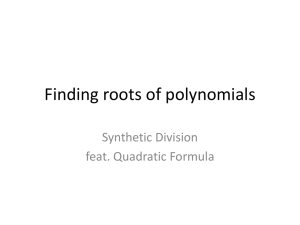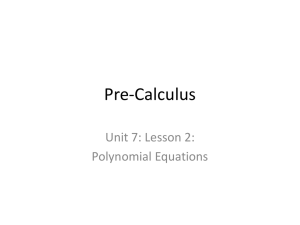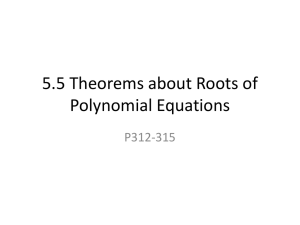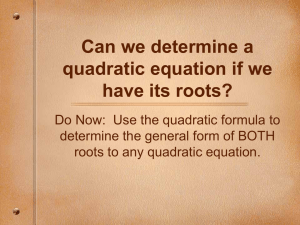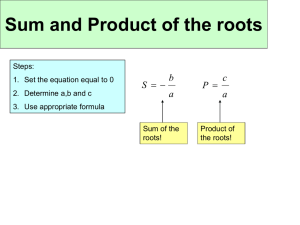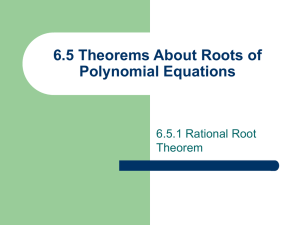Find the inverse of the function f(x)=3x-5.
advertisement
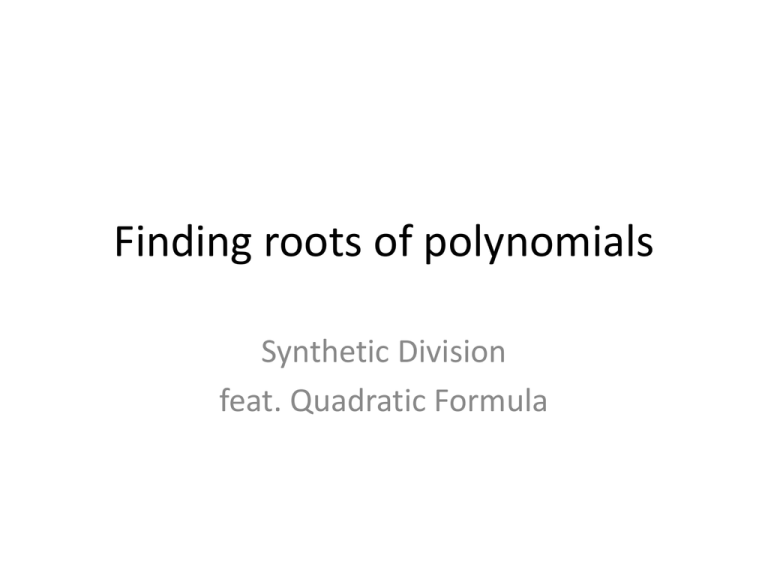
Finding roots of polynomials
Synthetic Division
feat. Quadratic Formula
Thinking about the quadratic formula
When ax2+bx+c=0….
-b
b - 4ac
±
2a
2a
2
x=
Examples
16
3±
= 3± 2 = 1 or 5
2
8
3±
= 3± 2
2
-16
3±
= 3± 2i
2
Examples
16
3±
= 3± 2 = 1 or 5
2
8
3±
= 3± 2
2
-16
3±
= 3± 2i
2
Irrational and
complex roots
come in pairs.
Pairs of roots
a + b c, a - b c
when a, b ¹ 0 c is not a perfect square
a + bi, a - bi
when b ¹ 0
Review: Synthetic Division
• x3+x2-4x-4. Root at x=2
1 3 2 0
2 | 1 1 -4 -4
2 6 4
1x3+1x2-4x-4=(x-2)(1x2+3x+2)
Putting it together
1) Start with a root guess
2) Use Synthetic Division to test roots and factor
the polynomial
3) When you have only a quadratic left, factor
(unFOIL) or use the quadratic formula
Putting it together
• x3+x2-4x-4. Root at x=2 First, synthetic division
1 3 2 0
2 | 1 1 -4 -4
2 6 4
1x3+1x2-4x-4=(x-2)(1x2+3x+2)
Putting it together
• x3+x2-4x-4. Root at x=2
First, synthetic division
1x3+1x2-4x-4=0
(x-2)(1x2+3x+2)=0
Next, split the factors
(x-2)=0 OR (1x2+3x+2)=0 Last, solve the quadratic
x=2
(x+1)(x+2)=0
(x+1)=0 OR (x+2)=0
x=-1, x=-2
Roots are -2, -1, and 2
Given that x = 2 is a zero of the polynomial
f(x) = x3 - 8x2 + 22x - 20, find the other zeros, both real and
complex.
a)
b)
c)
d)
e)
5 + i and 5 - i
3 + 2i and 3 - 2i
5 + sqrt(13) and 5 - sqrt(13)
- 3 + i and - 3 - i
None of the above
x3 - 8x2 + 22x – 20, root at 2
1 -6 10 0
2 | 1 -8 22 -20
2 -12 20
1x3-8x2+22x-20=(x-2)(1x2-6x+10)
-(-6)
(-6)2 - 4(1)(10)
±
2(1)
2(1)
36 - 40
-4
2i
= 3±
= 3±
= 3± = 3± i
2
2
2
E
Problem
• Synthetic Division needs a root guess
• How do we find good guesses for the roots?
– Graph
– Rational root theorem
Rational Root Theorem
ax7+bx6+….+mx+n
If the polynomial has a rational root p/q
Then p is a factor of the constant term,
and q is a factor of the leading coefficient.
Rational Root Test Example
1x3-3x2+2x-2
Factors of -2: {-2,-1,1,2}
Factors of 1: {1}
The only possible rational roots of this
polynomial are
-2/1, -1/1, 1/1, 2/1
Another Example
4x3-3x2+2x-5
Factors of -5: {-5,-1,1,5}
Factors of 4: {1,2,4}
The only possible rational roots of this
polynomial are
-5/1, -1/1, 1/1, 5/1, -5/2, -1/2, 1/2, 5/2, -5/4, 1/4, 1/4, 5/4
According to the rational root test, which of these is
NOT a possible root of ƒ(x)=15x4-6x3+2x2-72x+30?
a)
b)
c)
d)
e)
5/3
3/5
1
5/2
15
ƒ(x)=15x4-6x3+2x2-72x+30?
• The factors of 30 are 1,2,3,5,6,10,15,30
• The factors of 15 are 1,3,5,15
• Possible roots are red/blue
a)
b)
c)
d)
e)
5/3
3/5
1/1
5/2
15/1
D) 5/2
is NOT a
possible
root.
Putting it together
1) Use the Graphs or the Rational Root Test to
come up with guesses for roots.
2) Use Synthetic Division to test roots and factor
the polynomial
3) When you have only a quadratic left, use the
quadratic formula
Find the roots of ƒ(x)=3x3+3x-2x2-2
a)
b)
c)
d)
e)
-1, sqrt(6)/3, -sqrt(6)/3
-1, 2/3, 1
2/3, i, -i
2/3, sqrt(3), -sqrt(3)
None of the above
Find the roots of ƒ(x)=3x3+3x-2x2-2
Factors of -2: {-2, -1, 1, 2}. Factors of 3: {1, 3}
Possible roots: -1, 1, -2, 2, -1/3, 1/3, -2/3, 2/3,
3 0 3 0
2/3 | 3 -2 3 -2
2 0 2
3x3+3x-2x2-2=(x-2/3)(3x2+3)
=3(x-2/3)(x2+1) =3(x-2/3)(x-i)(x+i)
c) 2/3, i,-i
